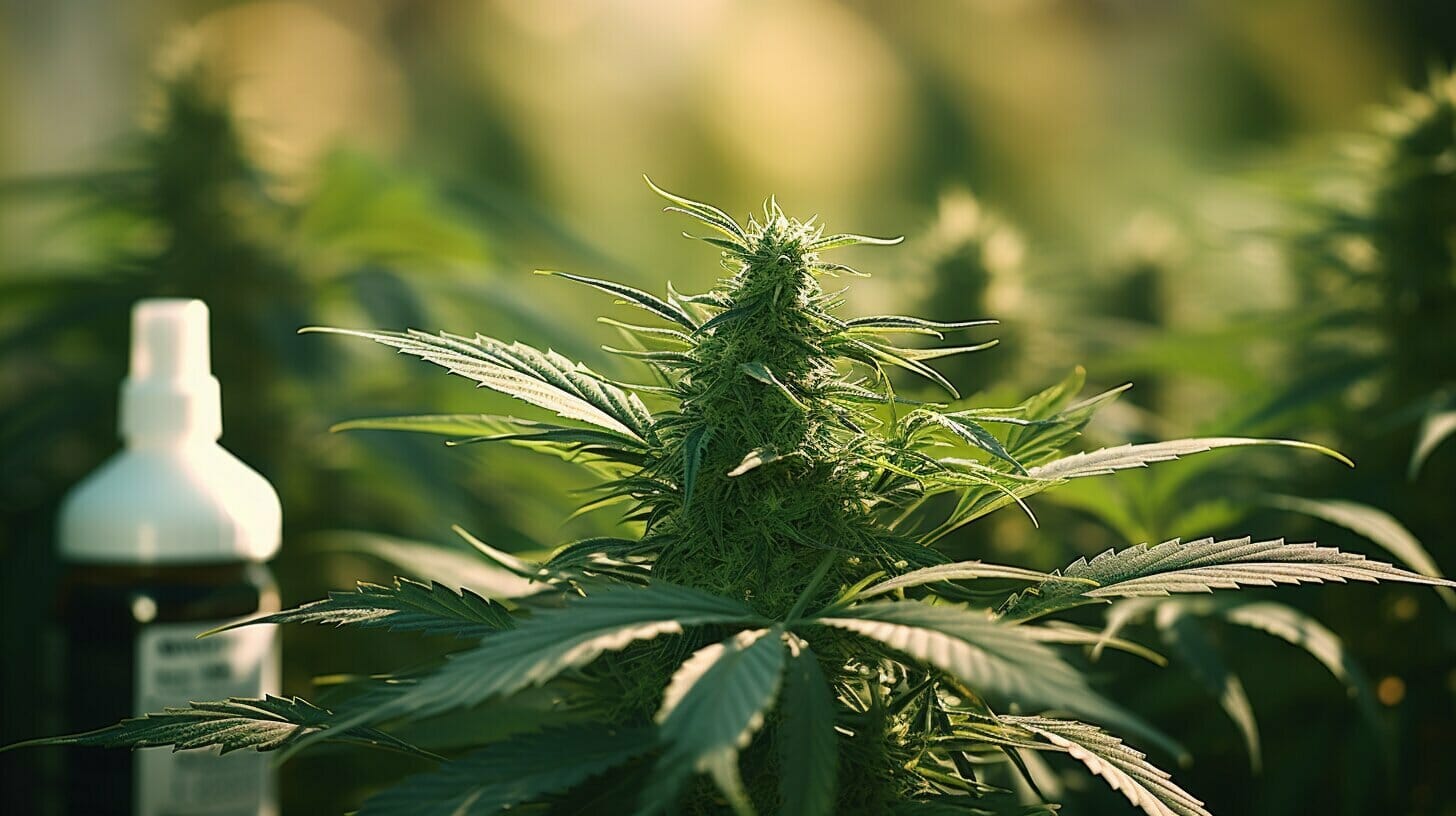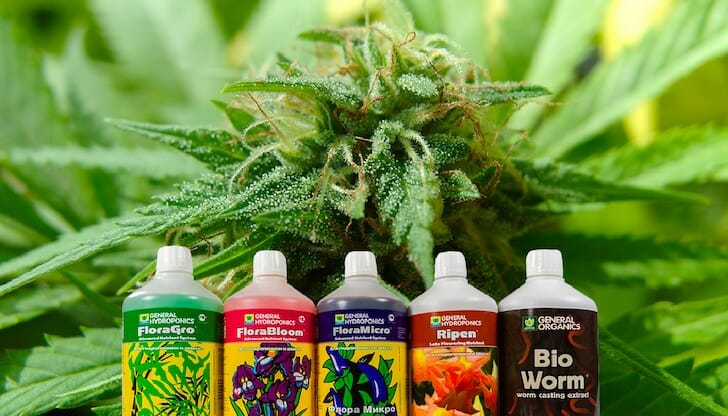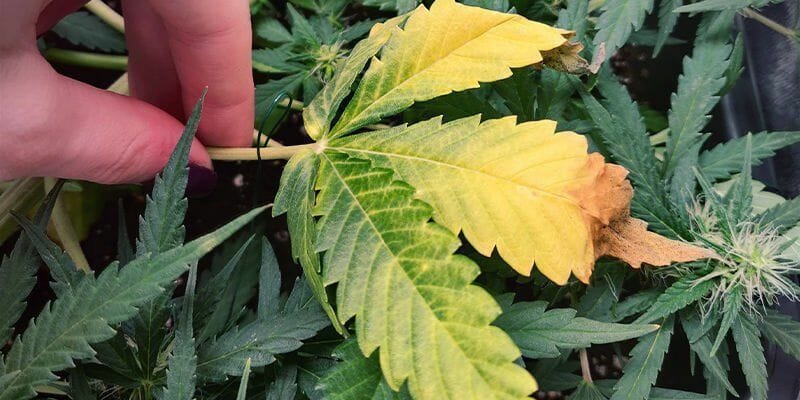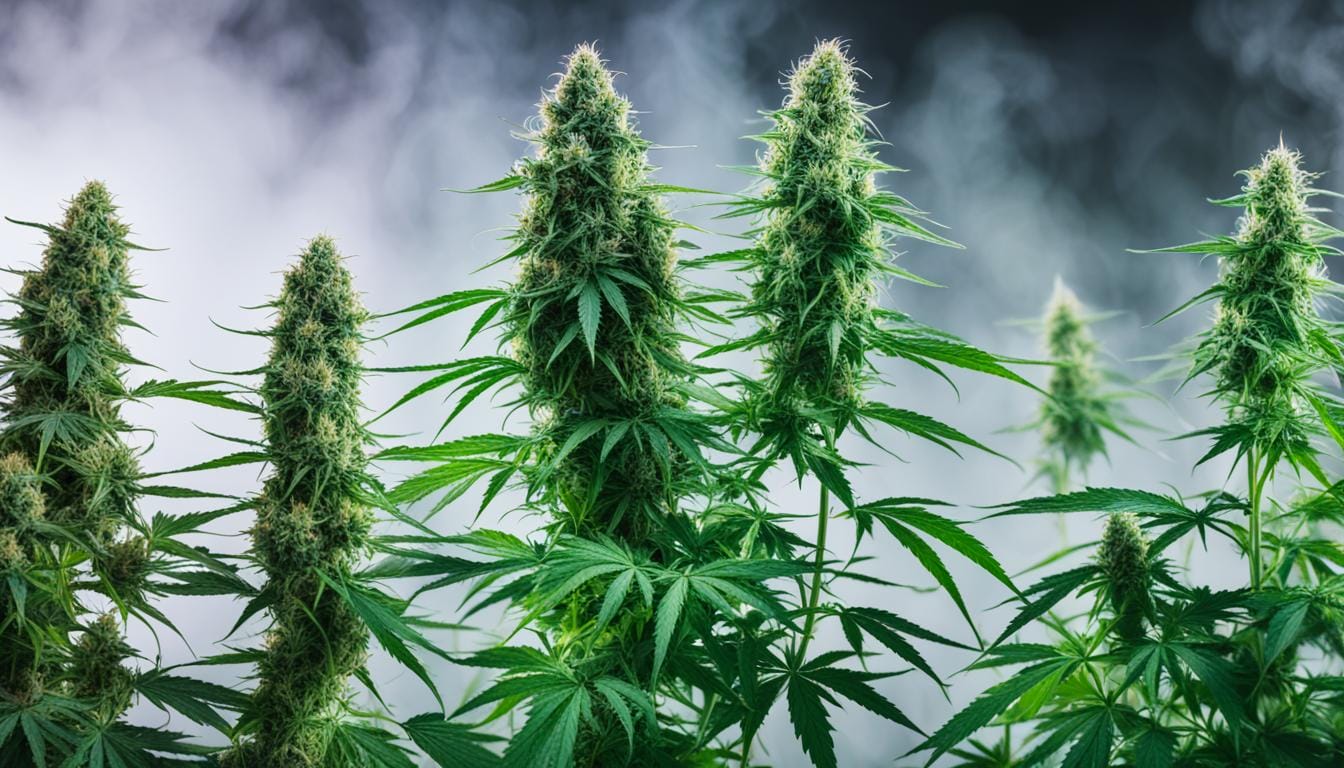Introduction to AI in Agriculture The integration of Artificial Intelligence (AI) into agriculture is no longer a futuristic concept but a transformative reality. In the realm of agriculture, AI’s potential to optimize processes, maximize yields, and sustain environmental resources is unparalleled. This is especially pertinent in specialized sectors such as cannabis cultivation, where precision and […]
Best Nutrients for Cannabis: Optimize Growth & Potency

Choosing the right nutrients for cannabis plants is crucial to achieving robust, high-yielding plants with increased potency. The optimal combination of essential nutrients can elevate the overall health and growth of your cannabis plants. In this article, we will explore everything you need to know about selecting the best nutrients for your cannabis cultivation, including understanding the essential nutrients required by cannabis plants, top nutrient brands, and guidance on diagnosing and correcting nutrient deficiencies.
Key Takeaways:
- Choosing the right nutrients is critical for ensuring optimal growth and potency in cannabis plants.
- Essential nutrients required by cannabis plants include macronutrients and micronutrients, which play crucial roles in plant growth and development.
- The ideal nutrient ratios for healthy plant growth vary depending on the plant’s growth stage.
Understanding Cannabis Plant Nutrients
When it comes to growing healthy, robust cannabis plants, selecting the right nutrients is crucial. Cannabis plants require a range of essential nutrients to thrive, including macronutrients and micronutrients.
Macronutrients, such as nitrogen, potassium, and phosphorus, are required in larger quantities and play a crucial role in the growth and development of cannabis plants. Alternatively, micronutrients such as calcium, magnesium, and sulfur, are required in smaller quantities but are equally important for the plant’s overall health and vitality.
When selecting nutrients for your cannabis plants, it’s important to understand the role of each nutrient and the ideal ratios required for healthy growth. The right combination of nutrients will provide your plants with the energy and resources they need to develop robust stems, healthy leaves, and abundant flowers.
Top Nutrients for Cannabis Growth
When it comes to choosing the best nutrients for cannabis plants, the choices can seem overwhelming. With so many options on the market, it can be difficult to know which nutrients are truly the best for optimizing growth and potency. To help guide you in your nutrient selection, we’ve compiled a list of some of the top nutrients for cannabis growth.
| Brand | Benefits |
|---|---|
| General Hydroponics Flora Series | A versatile three-part nutrient system that can be used in soil, hydroponic, and aeroponic setups. Known for promoting rapid growth and robust yields. |
| Advanced Nutrients pH Perfect | A complete fertilizer system that automatically adjusts pH levels, ensuring optimal nutrient uptake. Known for producing potent and flavorful buds. |
| Fox Farm Trio | A three-part organic fertilizer system that provides a balanced blend of nutrients. Known for improving soil quality and producing high-quality, aromatic buds. |

Of course, there are many other nutrient brands and products on the market, and the best choice for your cannabis plants will depend on a variety of factors such as growing medium, cultivation method, and plant genetics. It’s always a good idea to do your own research and experiment with different nutrient brands to find what works best for your unique setup.
Nutrient Guide for Cannabis
Choosing the right nutrients for your cannabis plants is crucial for achieving optimal growth and potency. It’s essential to understand the different nutrient schedules, including vegetative and flowering stages, to ensure proper nutrient uptake and avoid deficiency or toxicity problems. Here’s a detailed guide on nutrient selection and application for cannabis cultivation:
Nutrient Ratios
There are three essential macronutrients that cannabis plants require for healthy growth: nitrogen (N), phosphorus (P), and potassium (K). These elements are commonly referred to as NPK and are present in most fertilizers. The ideal NPK ratio for vegetative growth is around 3:1:2, while flowering plants require a higher ratio of phosphorus to encourage bud formation and development.
In addition to NPK, it’s essential to ensure that your plants are receiving adequate amounts of secondary macronutrients, such as calcium (Ca) and magnesium (Mg), as well as trace elements like iron (Fe), zinc (Zn), and copper (Cu). These are typically included in commercial fertilizers, but it’s essential to monitor levels and adjust accordingly.
pH Levels and Water Quality
The pH level of your nutrient solution plays a crucial role in the absorption and availability of nutrients to your plants. Cannabis plants prefer a slightly acidic pH range between 5.5 and 6.5. Maintaining proper pH levels can be achieved through regular monitoring and adjustment using pH testing kits or digital meters.
Water quality is also a factor in nutrient uptake. Cannabis plants require clean, oxygenated water that is free from contaminants. Using filtered or distilled water can help ensure the water you’re using doesn’t contain excess minerals or chemicals that can impact plant health.
Nutrient Schedule
It’s essential to follow a nutrient schedule that suits the growth stage of your cannabis plants. During the vegetative stage, plants require more nitrogen to encourage leafy growth, while flowering plants require more phosphorus and potassium to promote bud development. Most commercial nutrient manufacturers provide specific schedules for each growth stage, which should be followed for optimal results.
It’s also important to avoid overfeeding your plants, as this can lead to nutrient burn and other problems. Start with smaller amounts of nutrients and gradually increase as necessary, monitoring plant health throughout the process.
Essential Nutrients for Cannabis Plants
Cannabis plants require a range of essential nutrients for healthy growth and development. These nutrients can be broken down into two categories: macronutrients and micronutrients.
Macronutrients
Macronutrients are the nutrients required in larger quantities and include:
| Nutrient | Function |
|---|---|
| Nitrogen | Essential for vegetative growth and protein synthesis. |
| Phosphorus | Crucial for flower development and root growth. |
| Potassium | Promotes bud development and strengthens the plant against disease and stress. |
| Calcium | Required for cell wall development and nutrient uptake. |
| Magnesium | Important for photosynthesis and chlorophyll production. |
It is important to maintain the appropriate ratios of macronutrients to prevent nutrient imbalances.
Micronutrients
Micronutrients are required in smaller quantities but are still essential for healthy plant growth and include:
- Iron
- Zinc
- Manganese
- Boron
- Copper
- Molybdenum
- Chloride
Although micronutrients are required in smaller amounts, they play a vital role in plant growth and development.
Organic Nutrients for Cannabis
Organic nutrients can provide significant benefits for cannabis cultivation. In contrast to synthetic fertilizers, organic fertilizers, and soil amendments enhance soil health, promote beneficial microbial activity, and increase overall plant vigor. Furthermore, the use of organic nutrients can help produce cannabis plants with better flavor and aroma profiles.
One of the most popular organic fertilizers for cannabis is worm castings, a nutrient-rich compost produced by earthworms. Worm castings provide a diverse range of micronutrients and beneficial microorganisms, making them a valuable addition to any soil mix. Other organic fertilizers that can be used for cannabis cultivation include compost teas, bat guano, and fish emulsion.
In addition to organic fertilizers, soil amendments such as peat moss, coconut coir, and perlite can be used to improve soil texture and water retention. These amendments help maintain a healthy root zone, allowing the plants to absorb nutrients more effectively.
“Organic nutrients can provide significant benefits for cannabis cultivation.”
It’s important to note that organic nutrients can be more difficult to use than synthetic fertilizers, as they require the right conditions to break down and become available to the plants. Organic fertilizers typically require a longer period of time to become effective than synthetic fertilizers, and their nutrient levels can vary between batches. However, the use of organic nutrients can lead to improved soil structure and long-term soil health, making them a valuable investment for cannabis growers.
In summary, organic nutrients are an excellent choice for growers looking to improve the quality of their cannabis plants while promoting sustainable cultivation practices. By using organic fertilizers and soil amendments, cannabis growers can enhance soil health, promote beneficial microbial activity, and increase overall plant vigor.
Hydroponic Nutrients for Cannabis
Hydroponic systems are becoming increasingly popular in cannabis cultivation due to their efficiency and ability to produce high yields in a controlled environment. However, hydroponic plants have unique nutrient requirements that must be met to ensure optimal growth and health.
Hydroponic Nutrient Solutions
Hydroponic nutrient solutions are specially formulated to provide plants with all the necessary macronutrients and micronutrients required for healthy growth. These solutions are typically added to the hydroponic reservoir, which then feeds the plants directly.
Some popular hydroponic nutrient solutions for cannabis include:
| Brand | Features |
|---|---|
| General Hydroponics Flora Series | Customizable nutrient ratios, suitable for all hydroponic systems |
| Advanced Nutrients pH Perfect Connoisseur | Advanced pH buffering technology, ideal for experienced growers |
| Botanicare KIND | Organic nutrient solution, suitable for vegetative and flowering stages |
Maximizing Nutrient Uptake
Hydroponic plants rely on the nutrient solution in their reservoir for all their nutritional needs, so it’s crucial to ensure that the solution is well-balanced and that the plants are effectively absorbing the nutrients.
One way to optimize nutrient uptake is to monitor and adjust the pH levels regularly. Cannabis plants grown hydroponically thrive in a pH range of 5.5-6.5, depending on the growth stage. Deviations from this range can lead to nutrient deficiencies and reduced growth.
Another factor that affects nutrient uptake is the strength of the nutrient solution. It’s important to avoid overfeeding or underfeeding cannabis plants in hydroponic systems. This can be achieved by carefully following nutrient schedules and adjusting nutrient levels according to the plants’ needs.
Finally, maintaining a healthy root zone is crucial for effective nutrient uptake. Root rot and other fungal infections can impair the plant’s ability to absorb nutrients, so proper sanitation and air circulation must be ensured.
Nutrient Deficiencies in Cannabis Plants
Despite the best efforts of even the most skilled cannabis cultivators, nutrient deficiencies can still occur. Identifying these deficiencies early on is key to correcting them before they cause significant damage to your plants.
Here are some common nutrient deficiencies and their associated symptoms.
| Nutrient | Symptoms |
|---|---|
| Nitrogen | Yellowing of leaves, especially older ones; reduced growth |
| Phosphorus | Purplish leaves, slow growth, weak stems |
| Potassium | Yellowing or browning of leaf margins, weak stems |
| Magnesium | Yellowing between leaf veins, leaf curling, reduced growth |
If you notice any of these symptoms in your plants, it’s important to take action quickly to avoid any long-term damage.
The best way to correct nutrient deficiencies is by adjusting your nutrient solution to provide the missing nutrient in the correct ratio. If you’re using synthetic nutrients, follow the manufacturer’s instructions for adjusting nutrient levels.
If you’re using organic nutrients, consider supplementing with a foliar spray or soil amendment to provide the necessary nutrient. In either case, it’s important to monitor your plants closely to ensure the deficiency is corrected.

Nutrients for Cannabis: Choosing the Best Fertilizer
When it comes to growing cannabis, selecting the right fertilizer is crucial to achieving strong, healthy plants with high yields and potent buds. There are numerous options available, ranging from organic to synthetic fertilizers, each with its own advantages and disadvantages. Here, we offer some guidance on the best fertilizer for cannabis to help you make an informed decision.
Organic vs. Synthetic Fertilizers
Organic fertilizers are derived from natural sources and provide slow-release nutrients as they break down over time. Organic fertilizers improve soil health and promote microbial activity, making them an excellent choice for long-term soil health. Synthetic fertilizers, on the other hand, are manufactured using chemical processes and provide a quick burst of nutrients to plants. While synthetic fertilizers are more readily available and easier to use, they can also lead to nutrient imbalances and damage to soil health over time.
When deciding between organic and synthetic fertilizers, it is important to consider both your individual growing conditions and personal preferences. Organic fertilizers may require more maintenance and attention to detail, but they offer long-term benefits for soil health and plant growth. Synthetic fertilizers, on the other hand, may be more convenient and easy to use, but can have negative impacts on soil quality and plant health over time.
Choosing the Right Fertilizer for Cannabis
Cannabis plants require a variety of essential nutrients in order to grow and thrive. The most important of these are nitrogen, phosphorus, and potassium (NPK), which are typically found in balanced ratios in most high-quality fertilizers. In addition to NPK, cannabis plants also require other nutrients, such as calcium, magnesium, and trace elements, to support healthy growth.
When selecting a fertilizer for your cannabis plants, it is important to choose one that is specifically formulated for the plant’s needs. Many fertilizer brands offer products designed specifically for cannabis cultivation, with balanced ratios of essential nutrients and beneficial additives such as mycorrhizae and humic acid.
In addition to selecting the right fertilizer, it is also important to follow a regular fertilization schedule to ensure that plants receive the nutrients they need throughout their growth cycle. Different fertilizers are formulated for different stages of growth, with specific nutrient ratios optimized for the vegetative and flowering phases of cannabis growth.
Recommendations for the Best Fertilizer for Cannabis
There are many excellent fertilizer options available for cannabis cultivation, each with its own unique benefits and features. Some top recommendations for the best fertilizer for cannabis include:
- Fox Farm Liquid Nutrient Trio: This three-part liquid fertilizer system provides a balanced ratio of essential nutrients and trace elements, along with beneficial microbes and organic compounds. It is designed for use throughout the vegetative and flowering stages of cannabis growth.
- General Hydroponics Flora Series: This three-part synthetic fertilizer system is designed for use in hydroponic systems, but can also be used in soil-based growing. It provides a balanced ratio of essential nutrients and trace elements, along with beneficial additives such as vitamins and amino acids.
- Botanicare KIND Nutrient System: This five-part liquid fertilizer system is designed specifically for cannabis cultivation, with unique formulations for the vegetative and flowering stages of growth. It contains a balanced ratio of essential nutrients, along with beneficial additives such as kelp extract and fulvic acid.
Ultimately, the best fertilizer for your cannabis plants will depend on a variety of factors, including your growing conditions, personal preferences, and the specific needs of your plants. By doing your research and selecting a high-quality fertilizer that is formulated for cannabis cultivation, you can help to ensure that your plants receive the nutrients they need to grow strong, healthy, and potent.
Nutrients for Indoor Cannabis
Indoor cannabis cultivation requires careful consideration of the specific nutrient needs of the plants. With controlled environments devoid of natural light and weather fluctuations, indoor growers must ensure that their plants receive the right nutrients in the correct amounts to optimize growth and potency. Here are some of the top nutrients for indoor cannabis cultivation:
| Nutrient | Role | Recommended Products |
|---|---|---|
| Nitrogen | Essential for vegetative growth, photosynthesis, and protein synthesis | General Hydroponics Flora Series, Botanicare Pure Blend Pro Grow |
| Phosphorus | Crucial for flower development and energy transfer | Advanced Nutrients Big Bud, Fox Farm Open Sesame |
| Potassium | Necessary for overall plant health, stress tolerance, and resin production | Botanicare Kind, General Hydroponics FloraKleen |
| Calcium | Important for cell structure, nutrient uptake, and leaf development | Botanicare Cal-Mag Plus, Advanced Nutrients Sensi Cal-Mag Xtra |
| Magnesium | Crucial for photosynthesis, energy transfer, and enzyme production | General Hydroponics CaliMagic, Botanicare Cal-Mag Plus |
| Trace Elements | Required in small amounts for optimal plant health and function | General Hydroponics FloraMicro, Botanicare Pure Blend Pro Bloom |
When choosing nutrients for indoor cannabis, it’s essential to consider the specific needs of your plants at different growth stages. Some nutrient lines offer specialized formulas for seedlings, vegetative growth, and flowering. It’s also crucial to monitor pH and water quality to ensure optimal nutrient uptake and avoid nutrient lockout. Remember that overfeeding and underfeeding can both have negative effects on plant health and yield, so it’s crucial to follow a nutrient schedule and adjust as needed.
In conclusion, selecting the right nutrients for indoor cannabis cultivation is crucial for achieving robust, high-yielding plants with increased potency. By understanding the specific nutrient needs of your plants and carefully monitoring their growth and development, you can ensure maximum success in your indoor cannabis garden.
Ensuring Optimal Nutrient Uptake
Choosing the best nutrients for your cannabis plants is just the beginning of a successful cultivation process. Ensuring that your plants are effectively absorbing those nutrients is equally important.
pH Levels
One crucial factor in nutrient uptake is the pH level of the soil or growing medium. Cannabis plants prefer slightly acidic conditions, with a pH range of 6.0 to 6.5 for soil and 5.5 to 6.0 for hydroponic systems. Ensure that your pH levels are within this range to optimize nutrient absorption and prevent deficiencies.
Watering Practices
Overwatering or underwatering can also affect nutrient uptake. Cannabis plants require consistent, but not excessive, watering. Avoid letting the soil or growing medium dry out completely or become too saturated. Allow the top inch of the soil to dry out before watering again.
Nutrient Solution Strength
Providing the correct amount of nutrients is essential for optimal plant growth and development. It is important to follow the recommended dosage guidelines provided by the nutrient manufacturer. Overfeeding or underfeeding can result in nutrient deficiencies or toxicities.
Root Health
A healthy root zone is crucial for effective nutrient uptake. Ensure that your plants have adequate space in the pot or growing medium to promote root growth. Regularly check for signs of root rot or damage and address it promptly. Promote microbial activity in the soil or growing medium by using beneficial compost teas or microbe-rich fertilizers.
Best Nutrients for Cannabis: Conclusion
Choosing the right nutrients for cannabis cultivation can have a significant impact on plant growth, potency, and overall crop success. As we have seen, there are many factors to consider when selecting nutrients, including growth stage, growing method, and nutrient type.
Whether you choose organic or synthetic fertilizers, hydroponic or soil-based growing methods, or specific nutrient brands, the key is to pay close attention to your cannabis plants and adjust nutrient levels as needed. Regular monitoring of pH levels, water quality, and nutrient solution strength is essential to ensure optimal nutrient uptake and healthy growth.
By applying the expert advice provided in this article and taking a proactive approach to nutrient selection and application, you can achieve exceptional results in your cannabis garden and produce robust, high-yielding plants with increased potency.
FAQ
Q: What are the best nutrients for cannabis?
A: The best nutrients for cannabis are those that provide a balanced mix of macronutrients and micronutrients. This includes nitrogen, phosphorus, potassium, calcium, magnesium, and trace elements. It is important to choose nutrient brands that are known for promoting robust growth, abundant yields, and increased potency in cannabis plants.
Q: What are the essential nutrients required by cannabis plants?
A: Cannabis plants require a range of essential nutrients for healthy growth. These include nitrogen, phosphorus, potassium, calcium, magnesium, and trace elements. Each nutrient plays a vital role in different aspects of plant development, such as leaf growth, root development, and flower formation.
Q: Are organic nutrients better for cannabis cultivation?
A: Organic nutrients offer numerous benefits for cannabis cultivation. They enhance soil health, promote microbial activity, and improve overall plant vigor. Organic fertilizers and soil amendments provide a more sustainable and environmentally friendly approach to cannabis cultivation.
Q: What are the nutrient deficiencies that cannabis plants may experience?
A: Cannabis plants may experience nutrient deficiencies, which can impact their growth and overall health. Common deficiencies include nitrogen, phosphorus, potassium, calcium, and magnesium. It is important to regularly monitor plant health and adjust nutrient levels accordingly to prevent and correct deficiencies.
Q: What is the best fertilizer for cannabis?
A: The best fertilizer for cannabis depends on various factors, including the growth stage and growing method. Organic and synthetic fertilizers both have their pros and cons. It is recommended to choose fertilizers that provide a balanced mix of nutrients and are specifically designed for cannabis cultivation.
Q: What are the nutrient requirements for cannabis plants grown indoors?
A: Cannabis plants grown indoors have unique nutrient requirements due to the influence of artificial lighting, temperature, and humidity. It is important to select nutrients that are suitable for indoor cultivation and provide the necessary nutrients for optimal growth in an indoor environment.
Q: How can I ensure optimal nutrient uptake in cannabis plants?
A: To ensure optimal nutrient uptake in cannabis plants, it is important to monitor and adjust pH levels, follow proper watering practices, and maintain the right nutrient solution strength. Creating a healthy root zone is crucial for effective nutrient absorption and overall plant health.
Back





